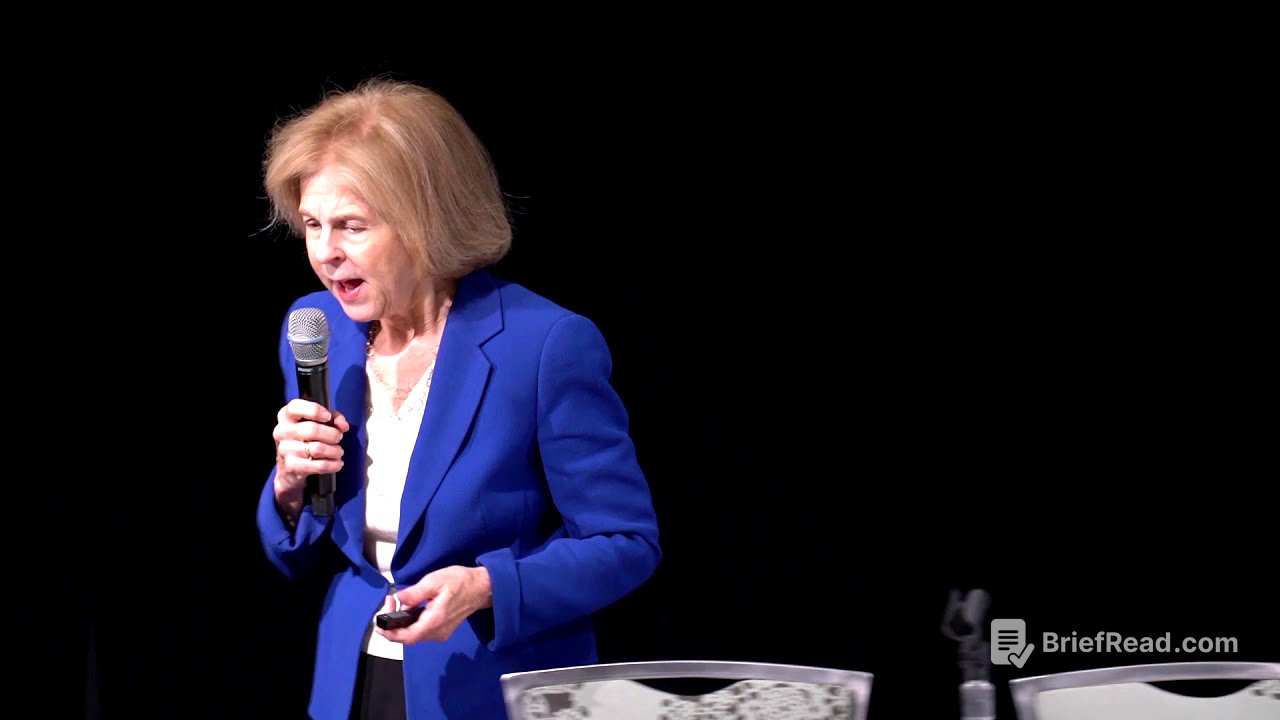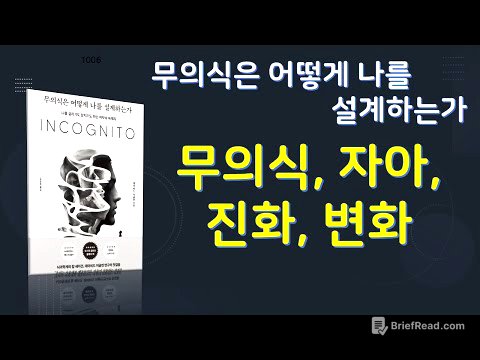TLDR;
This video features Dr. Elaine Pagels discussing the secret gospels and their implications for understanding Jesus and his teachings. The presentation explores texts discovered in Nag Hammadi, Egypt, in 1945, particularly the Gospel of Thomas, and examines how these texts offer alternative perspectives on Jesus's identity, the nature of the divine, and the path to spiritual knowledge.
- The Gospel of Thomas presents a collection of Jesus's sayings, some similar to those in the New Testament Gospels, and others unique, offering a different view of the kingdom of God as within oneself.
- These secret gospels were rejected by early church leaders like Irenaeus, who sought to unify Christianity under a single set of beliefs and structures, deeming them heretical.
- The discussion touches on the potential influence of Jewish mystical traditions and other religious philosophies on these gospels, as well as their relevance to personal spiritual growth and understanding.
Introduction and Welcome [0:00]
Kyle Queers, the associate director of the Kaufman Interfaith Institute, welcomes attendees to the annual academic consortium conference. He acknowledges Sylvia Kaufman's pivotal role in fostering interfaith dialogue in West Michigan through various initiatives, including the West Shore Committee for Jewish Christian dialogue and the West Michigan Academic Consortium. These efforts aimed to promote interfaith understanding and mutual acceptance, bringing together scholars, clergy, and students from diverse backgrounds. The consortium now includes eight colleges and universities dedicated to advancing knowledge and respect across belief systems.
Sylvia Kaufman's Remarks [2:05]
Sylvia Kaufman expresses her gratitude to Grand Valley State University for hosting the conference and welcomes its new president, President Filomeno Mantella. She recognises Brent Smith, the academic consortium committee member representing Grand Valley, and commends Junction's kenchi for his leadership as director of the Coffman Institute. Kaufman also acknowledges the contributions of Kyle coiours, Jesse Bernal, and the entire Coffman Institute team. She highlights that this is the 13th annual consortium conference and acknowledges the committee members from various colleges. Kaufman introduces Dr. Elaine Pagels, noting her distinguished accomplishments, including her professorship at Princeton, a MacArthur Fellowship, and a National Book Award for "The Gnostic Gospels". She shares a personal anecdote about her and her late husband's attempts to invite Dr. Pagels to speak at the conference, expressing excitement for her presentation on the secret gospels and their insights into Jesus and his teachings.
Introduction to the Secret Gospels [6:49]
Dr. Elaine Pagels expresses her joy at being present and acknowledges Sylvia Kaufman's work in building an interfaith community. She dedicates the day in honour of the late Dick Kauffman. Pagels begins her discussion on the secret gospels, discovered in 1945 in Upper Egypt, detailing how Muhammad Ali, a local villager, found a jar containing 13 books bound in tooled ghazal leather. These books contained various texts, including the Gospel of Thomas, which Pagels has been studying for years. She suggests that the Gospel of Thomas may have connections to Jewish mystical tradition, raising questions about Jesus's knowledge of it.
The Gospel of Thomas: An Overview [9:32]
Dr. Pagels introduces the Gospel of Thomas, highlighting its claim to contain the sayings of Jesus. She notes that about half of these sayings are similar to those found in the Gospels of Matthew and Luke, while the other half are unique. One such saying, discovered in a fragment from an Egyptian garbage dump, speaks of secret words of Jesus that lead to immortality if understood. Pagels mentions how Irenaeus of Lyon dismissed such gospels as heretical, filled with blasphemy and madness. She also recounts initial scholarly reactions that deemed these gospels late and derivative, a view that later shifted with scholars like Helmut Kester suggesting they might contain very early versions of Jesus's sayings.
Dating and Interpretation of the Gospels [15:18]
Dr. Pagels discusses the evolving scholarly perspectives on the Gospel of Thomas. She mentions Hans Martin Schenk ah, who believes some sayings are early and some are later interpretations, contrasting this with Simon gather coal, who views the text as derivative and worthless. Pagels notes the difficulty in tracing anything directly back to Jesus, given that he likely couldn't read or write. However, she asserts that these gospels suggest Jesus taught differently in private to his disciples, a practice common in many spiritual traditions.
Secret Teachings and the Kingdom of God [18:29]
Dr. Pagels explores the plausibility of Jesus having secret teachings, noting Irenaeus's opposition to the idea. She references the Gospel of Mark, which suggests Jesus shared mysteries of the kingdom of God with his inner circle, using parables to obscure meaning from outsiders. She contrasts this with the Gospel of Thomas, where Jesus describes the kingdom of God not as a place or event, but as something within and outside oneself, attainable through self-knowledge.
Finding the Kingdom and the Primordial Light [22:49]
Dr. Pagels suggests that the Gospel of Thomas supplements, rather than replaces, the New Testament Gospels. She contrasts the New Testament's focus on the end times with the Gospel of Thomas's emphasis on the beginning, urging listeners to seek the primordial light described in Genesis. This light, understood by rabbis as divine energy, is linked to the divine image with which Adam was created.
Jesus as Light and the Divine Image [26:46]
Dr. Pagels discusses the Gospel of Thomas's portrayal of Jesus not just as the Messiah, but as light, echoing the Gospel of John. She explains that Jesus speaks as a voice from the divine energy at the beginning of time, permeating the universe. This concept resonates with Kabbalistic teachings about divine energy. She references Ezekiel's vision of God's glory as light and connects it to the creation of Adam in God's image, imbued with divine energy.
Seeking the Divine Light Within [32:18]
Dr. Pagels explains that the Gospel of Thomas encourages continuous seeking until one finds the divine light within, leading to trouble and astonishment. She interprets the saying "If you bring forth what is within you, what you bring forth will save you" as both a psychological and theological statement. She suggests that deep introspection reveals the divine energy as the source of being. Jesus encourages his disciples to look within themselves to find the light, which can illuminate the world.
Transforming Identity and Baptism [34:38]
Dr. Pagels explains that the Gospel of Thomas is about transforming one's sense of identity, moving beyond conventional markers like name, family, and origin. She connects the saying about taking off clothes without shame and becoming like little children to the practice of baptism in the early Christian church. In this context, baptism symbolises a new beginning, a departure from one's old identity and an embrace of a new spiritual identity rooted in the divine light.
The Twin and the Divine Image [37:49]
Dr. Pagels explores the significance of Thomas's name, "twin," suggesting that it implies a spiritual connection between the believer and Jesus. She explains that the Gospel of Thomas teaches that through accepting Jesus's teachings, one becomes like him, sharing in the same divine origin and participating in the same spiritual life. She discusses sayings about the divine image, noting that the light within images is hidden, and that seeing one's image before birth can be both powerful and unsettling.
The Saying on Making the Female Male [41:10]
Dr. Pagels addresses the controversial saying about making the female male, clarifying that it's not about misogyny but rather a Midrash on Genesis 1:27. She explains that the original creation of humankind was a single, spiritual being, and the division into male and female resulted in a loss of the divine image. She references a saying where Salome questions Jesus's identity, and Jesus responds by rejecting gendered identification. The ultimate goal is reconciliation to being one, transcending gender divisions to enter the kingdom.
Rejection of the Gospel of Thomas [46:30]
Dr. Pagels explores why the Gospel of Thomas was rejected, suggesting it's because the New Testament Gospels emphasise Jesus's uniqueness as the Messiah and Son of God. In contrast, the Gospel of Thomas suggests that humans can also come from the same divine source as Jesus. She notes echoes of Jewish mystical teaching in this idea and wonders if such teachings were preserved in sources deemed Christian heresy.
Gnosis and Orthodoxy [49:22]
Dr. Pagels contrasts the Gospel of John's emphasis on knowing and believing in Jesus with the Gospel of Thomas's focus on knowing oneself. She explains that "gnosis" refers to a knowledge of the heart, a recognition of one's true nature, rather than intellectual knowledge. She contrasts Orthodox teachings, which emphasise God's otherness, with esoteric teachings that suggest a continuity between God and human nature, with humans created in God's image and intrinsically related to the divine.
Heresy and the Canon [52:41]
Dr. Pagels addresses whether the Gospel of Thomas is heretical, noting that it challenges the Orthodox view of a complete discontinuity between the divine and human. She explains that the Gospel of Philip encourages believers to become like Christos, suggesting a path to becoming more like Jesus. She discusses how Constantine sought to unify the Roman Empire through Christianity, leading to the creation of a creed and canon that excluded sources claiming secret teachings.
Constantine and the New Testament [55:13]
Dr. Pagels details Constantine's efforts to unify Christians by establishing institutional structures, a creed, and a canon. She explains that Bishop Athanasius of Alexandria played a key role in defining the New Testament canon, excluding the secret gospels to prevent people from being led astray. She notes that these secret gospels were being read by monks in Egypt, who had carefully translated them into Coptic. Constantine's goal was to create a universal church with a unified doctrine, discrediting any sources claiming secret teachings or new visions.
Additional Secret Gospels [1:00:04]
Dr. Pagels introduces other secret gospels, such as the Gospel of Mary Magdalene, which portrays Mary as a primary disciple vindicated despite Peter's ridicule. She also mentions the Secret Revelation of John, where John has a vision of a divine presence identifying as father, mother, and son. Additionally, she references the Revelation of the Austrian, where a young Jewish man finds divine light in the desert, and the poem "Thunder Perfect Mind," which speaks of a divine power present in both palaces and garbage dumps.
Thunder Perfect Mind and Conclusion [1:03:55]
Dr. Pagels discusses the poem "Thunder Perfect Mind," highlighting its paradoxical nature and its influence on women artists like Toni Morrison and Leslie Marmon Silko. She notes that Irenaeus would likely consider such texts heretical, attributing human emotions and intentions to God. Dr. Pagels concludes by opening the floor for questions, acknowledging the imaginative and potentially controversial nature of these sources.
Questions and Answers - Hindu Mysticism and Irenaeus [1:07:07]
The Q&A session begins with a comment appreciating Dr. Pagels's ability to provide information and stimulate thought. The first question addresses Irenaeus's rejection of alternative gospels despite his proximity to Jesus chronologically. Dr. Pagels suggests that Irenaeus's stance was influenced by the intense persecution faced by Christians at the time, leading him to seek unity and define clear boundaries for the faith. She also notes the possibility of Indian teachings influencing heretical ideas, given Thomas's traditional association with India.
Open Minds and the Problem of Ego [1:14:04]
A questioner reflects on their Catholic upbringing and subsequent exploration of alternative ideas, raising concerns about the potential for losing one's way and developing egotistical beliefs. Dr. Pagels agrees that anyone can fabricate secret teachings and that these teachings can lead to foolishness or insanity if interpreted egotistically. She emphasises that this kind of teaching has always been transmitted from teacher to disciple, ensuring maturity and responsible handling of the material.
Egyptian Influences and the Nicene Creed [1:15:57]
A participant shares their interest in the Egyptian Book of the Dead and suggests that Jesus's time in Egypt might have influenced his teachings. Dr. Pagels acknowledges the possibility of Egyptian and Buddhist influences, noting the concept of Jesus as the "living one" akin to the Buddha as the "enlightened one". Another questioner seeks clarification on the Nicene Creed and its political context. Dr. Pagels confirms that Constantine's desire for unity influenced the creed and that it established an institution claiming to be the only way of salvation. She concludes by affirming the value of interfaith dialogue and the insights gained from diverse traditions and writings.









